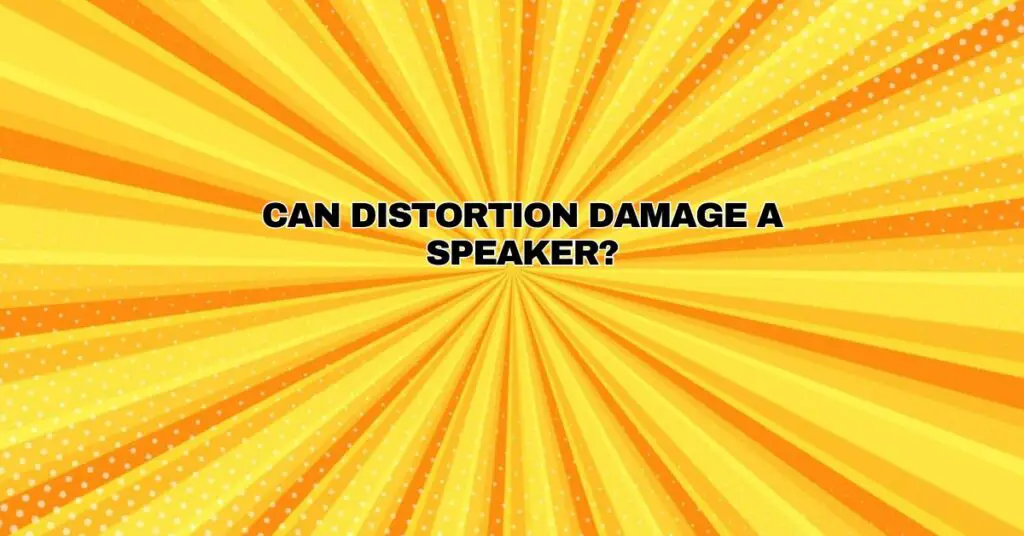Speakers are crucial components of audio systems, responsible for reproducing sound with clarity and fidelity. However, they are also susceptible to damage if not handled and driven correctly. One common concern among audio enthusiasts is whether distortion, a phenomenon where the audio signal deviates from its original form, can damage speakers. In this comprehensive article, we will explore the effects of distortion on speakers, how it can impact their longevity and sound quality, and what measures can be taken to prevent potential damage.
Understanding Distortion in Audio
Distortion, in the context of audio, refers to any alteration or deviation of the sound signal from its original form. While some forms of distortion are intentional and used creatively in music production (e.g., guitar distortion for rock music), undesired distortion can have detrimental effects on both the sound quality and the speaker’s physical integrity.
There are various types of distortion in audio, including:
- Clipping: Clipping occurs when an amplifier cannot provide enough power to the speaker, causing the waveform to “clip” or be cut off. This results in a harsh and distorted sound that can damage the speaker.
- Overdriving: Overdriving happens when an amplifier is pushed beyond its rated capacity, causing it to send excessive power to the speaker. This can lead to physical damage or even burnout of the speaker’s voice coil.
- Harmonic Distortion: This type of distortion introduces additional harmonics or frequencies into the audio signal. While low levels of harmonic distortion are often inaudible, excessive levels can affect sound quality.
The Impact of Distortion on Speakers
Distortion can have several adverse effects on speakers:
- Voice Coil Overheating: When a speaker is subjected to excessive power or clipping, the voice coil can overheat. This can lead to insulation breakdown, which may cause the coil to short-circuit, rendering the speaker inoperable.
- Mechanical Damage: Distortion can cause the speaker cone to move excessively, potentially leading to physical damage. Prolonged exposure to distorted signals can result in tears or deformation of the cone and suspension components.
- Reduced Longevity: Continual exposure to distortion can significantly reduce the speaker’s lifespan. Over time, the stress placed on the components can lead to wear and tear, affecting both the driver’s performance and longevity.
- Sound Quality Degradation: Excessive distortion can result in poor sound quality, including muddied or harsh audio. Listeners may notice a lack of clarity and dynamics, making it essential to address distortion issues to maintain audio fidelity.
Preventing Distortion Damage to Speakers
Preventing distortion damage to speakers is essential for ensuring longevity and sound quality:
- Use Adequate Power: Match the power output of your amplifier to the speaker’s specifications. Avoid underpowering or overpowering speakers, as both can lead to distortion issues.
- Set Gain Levels Correctly: Calibrate the gain levels on your amplifier or receiver to ensure that you are not overdriving the speakers. Avoid turning the volume too high, especially if you hear distortion.
- Monitor Clipping: Keep an eye (or ear) out for clipping, which can be audible as a harsh, distorted sound. If you hear clipping, reduce the volume immediately to prevent damage.
- Select Quality Audio Sources: Use high-quality audio sources and recordings to minimize the potential for harmonic distortion. Low-quality audio files can introduce unwanted artifacts into the sound.
- Invest in Quality Components: Choose reputable and well-matched components for your audio system, including amplifiers and speakers. Quality components are less likely to introduce distortion.
- Monitor Speaker Health: Regularly inspect your speakers for signs of physical damage or wear. Address any issues promptly to prevent further damage.
- Consult Audio Professionals: If you are unsure about your system’s setup or are experiencing distortion issues, consult with audio professionals who can help you optimize your setup for the best sound quality.
Conclusion
Distortion, when left unaddressed, can indeed damage speakers, both physically and acoustically. It’s crucial to take measures to prevent distortion and ensure that your audio system operates within safe parameters. By using appropriate power, setting gain levels correctly, and monitoring for signs of distortion, you can maintain the longevity and sound quality of your speakers, ultimately enhancing your listening experience for years to come.


